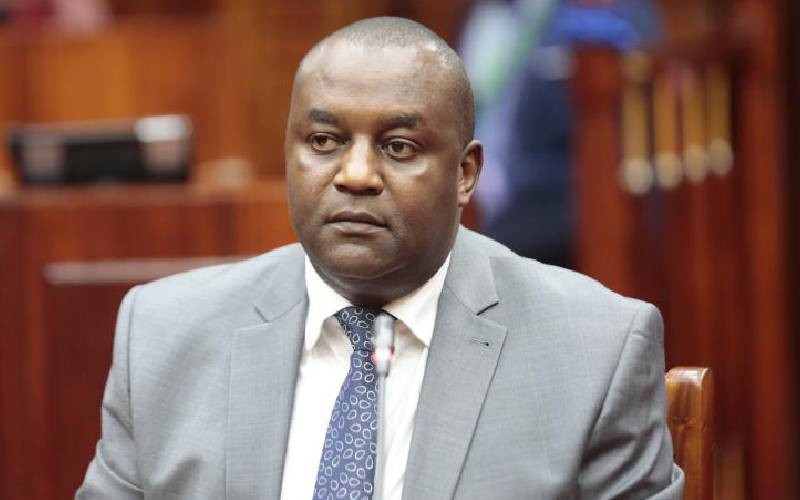BY GATONYE GATHURA
KENYA: The United Nations has called for the immediate end of use of petroleum and coal energy to cool an overheating global climate.
In its third and final report released on Sunday, the UN Intergovernmental Panel on Climate Change (IPCC) said the only way to save the earth from overheating is to immediately cut the use of fossil fuels.
The panel suggested that the world should change to other energy sources such as solar, wind, nuclear and biofuels.
Two weeks ago, the panel released a chilling report predicting increased diseases, severe food shortages and massive coastal flooding that would cost the coastal city of Mombasa Sh90 billion in losses by 2030.
It also predicted cases of deadly meningitis and malaria epidemics that would impoverish communities.
The report forecast how the world would look like in days to come while the Sunday release was a prescription on what needs to be done to avoid a catastrophe.
“We really need bold action, way beyond what anyone has in mind at the moment,” said lead author Dutch economist Reyer Gerlagh.
“But if you implement drastic policy effectively, it’s actually not expensive at all. It’s not half as painful as people think,” he added.
The UN wants action taken immediately because delaying beyond 2030 would make it much harder to keep temperature change below the ideal two degrees.
Fossil fuels
The major targets are fossil fuels such as petroleum and coal to be replaced with electricity, biofuels, hydrogen wind and other renewable sources. The UN wants countries such as India to stop subsidising petrol purchases to make it less attractive.
The report deals a big blow to Kenya’s energy sector with the recently discovered fuel in Turkana region, where the country intends to reap maximally and position herself as an energy powerhouse in the continent.
The panel sees a possible phase out of fossil fuels in decades to come while on the other hand Kenya is working hard to get its first oil exports into the market before 2020.
A recent briefing in London by Tullow Oil Company, the firm drilling oil in Kenya, said the company might pump about 50,000 barrels of oil a day in 2020.
Stay informed. Subscribe to our newsletter
Tullow Chief Operating Officer Paul McDade had told investors that Kenya is treating the oil business as a national priority and is committed in getting the oil into the market as soon as possible.
Also, the Government estimates coal deposits in the Mui Basin, Kitui County to be valued at over US$40 billion, and projects that successful exploitation of the mineral could provide up to 3,500 megawatts of cheap electricity.
Vision 2030
This is where the catch is; the UN panel wants dirty fuels such as coal removed from the production of electricity. This, it says, could slow down economies but is the only way to go. This will greatly undermine Kenya’s effort to industrialise and eat deep into Vision 2030.
“The point is to ‘decarbonise’ electricity generation, which will have negative effects in industry, buildings and the transport sector,” the report said.
“I must admit that there is excitement about oil and coal discoveries across the country and the talk about divesting from fossil fuels would be frowned upon by Kenyan authorities. Yet, investment in renewable energy sources, is the right thing to do,” said Mithika Mwenda, the secretary general of the Pan-African Climate Justice Alliance.
Mr Mithika whose organisation was involved in the development of the report said the proposed measures could be painful and may slow the economy initially but eventually would pay dividends.
“We are already feeling the effects of a warmer climate in the form of more respiratory diseases, droughts, food shortages and frequent flood. Things may get worse unless we act now,” he told The Standard.
Nuclear energy
Mithika’s organisation warns against the move towards nuclear energy in Kenya because of what it calls ‘major barriers including safety, regulatory risks and difficult waste management issues’.
“A case in point is the Fukushia nuclear facility disaster in Japan, which was hit by an earth quick in 2011 and is still a headache for the highly developed county. What if this happened in a poor country such as ours?” he posed.
 The Standard Group Plc is a
multi-media organization with investments in media platforms spanning newspaper
print operations, television, radio broadcasting, digital and online services. The
Standard Group is recognized as a leading multi-media house in Kenya with a key
influence in matters of national and international interest.
The Standard Group Plc is a
multi-media organization with investments in media platforms spanning newspaper
print operations, television, radio broadcasting, digital and online services. The
Standard Group is recognized as a leading multi-media house in Kenya with a key
influence in matters of national and international interest.
 The Standard Group Plc is a
multi-media organization with investments in media platforms spanning newspaper
print operations, television, radio broadcasting, digital and online services. The
Standard Group is recognized as a leading multi-media house in Kenya with a key
influence in matters of national and international interest.
The Standard Group Plc is a
multi-media organization with investments in media platforms spanning newspaper
print operations, television, radio broadcasting, digital and online services. The
Standard Group is recognized as a leading multi-media house in Kenya with a key
influence in matters of national and international interest.






